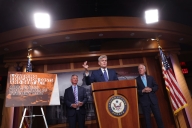You have /5 articles left.
Sign up for a free account or log in.
The Pennsylvania State System of Higher Education will freeze tuition for the second time in its history for the upcoming 2019-20 academic year, a move that can be seen as a public gesture of goodwill, coming as the embattled system negotiates a cloudy future leaders hope will include structural changes and renewed support from lawmakers.
The system's Board of Governors approved the tuition freeze Wednesday, keeping basic in-state undergraduate tuition at $7,716 at the system's 14 universities. PASSHE, which includes a group of state-owned regional public universities but not Pennsylvania State University or the University of Pittsburgh, is in the midst of a closely watched redesign effort as it faces deep financial and enrollment pressures.
While freezing tuition is good for students, it is a challenge for the system's universities, said Dan Greenstein, who has been PASSHE's chancellor since May 2018. The freeze signals that the system and its universities intend to look for new ways of doing business.
“Most importantly, it means the board is serious in its purpose of putting our students first -- to look for every possible means of ensuring that we deliver the best we can for our students without continuing to raise the price of their higher education,” Greenstein said in an interview. “We've built this system redesign program, this initiative where we're addressing both the cost drivers and revenue levers. We're pulling on all of them aggressively, and it's really with that promise that the board is saying we're doing everything we possibly can before we turn to the student.”
The only other time the 36-year-old system has frozen tuition was in 1998-99. The freeze comes on the heels of a new policy approved in April that will next year allow individual universities to set their own multiyear tuition strategies for the first time. Those strategies will be subject to board approval.
Almost nine out of 10 students enrolled in PASSHE's universities live in Pennsylvania. The system enrolls about 100,000 students.




